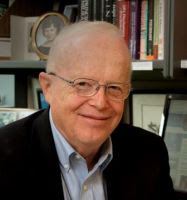David G. Myers, whose picture I have provided above, is a professor of psychology at Hope College. He is also the author of a recent book, How Do We Know Ourselves?
Myers' book is subtitled, "Curiosities and Marvels of the Human Mind." It was reviewed in the December 19, 2022, edition of The Wall Street Journal, which is where the book came to my attention. Online, the book review, by Matthew Hutson, is accompanied by the following photograph (not carried in the hard copy version of the paper):
I like the photo, since it seems to depict, rather well, what many of us assume is a good way to "know ourselves." Look in the mirror, we think, internally or externally! That would be the prescription. Let's see what we see! That's how many people might think they can "know themselves."
As some may recall from a course in philosophy, or otherwise, "knowing oneself" is often claimed to be the "sum of all philosophical commandments." Socrates told us that, and Aristotle said, “Knowing yourself is the beginning of all wisdom.”
In reviewing Myers' book on the subject, Hutson says that the title ought really to be, "How Well do We Know Ourselves?" Much of the book, according to Hutson, proves that we "misjudge not only our individual selves but others of the species." Lots of evidence is adduced to demonstrate that our efforts to know ourselves can be highly misleading.
The reason that I am writing about this topic (not having read the book, but only the review) is because I think that the statement I am highlighting below is profoundly true. The statement is found in the review, and it is a little unclear to me whether this is a statement endorsed by Myers, the author, or Hutson, the reviewer. Maybe it's both. As I say, I think the following statement is the real way we can know ourselves, and find out who we are:
Now, how do we know ourselves? One answer: through action.
As I have mentioned before, Hannah Arendt's wonderful book, Between Past And Future, retells a fable that came originally from Franz Kafka. A man is caught up in a struggle that pits both past and future against the man, who is in the middle - and such is our life. inevitably. This man in the middle is us, each one of us. We are all in that position, the future repels us, and pushes us back, but the past is always pushing us forward. We're trapped in the conflict, and we truly do dream that we might be able to jump out of the fighting line, and "be promoted ... to the position of umpire."
We want, in other words - we desperately yearn - to have a role in life defined by what we observe.
The role of umpire, however, is not available to us. Never. We are, inevitably, in the fight, and we cannot know ourselves - or anything else - by mere observation.
Whether we like it or not, whether we deny it or not, if we want to know ourselves, we can't just look in a mirror and observe. We are not above or outside the struggles and battles that define our present. We are inevitably in the fight.
Since we are, if we want to know ourselves, we will know ourselves through action!



No comments:
Post a Comment
Thanks for your comment!